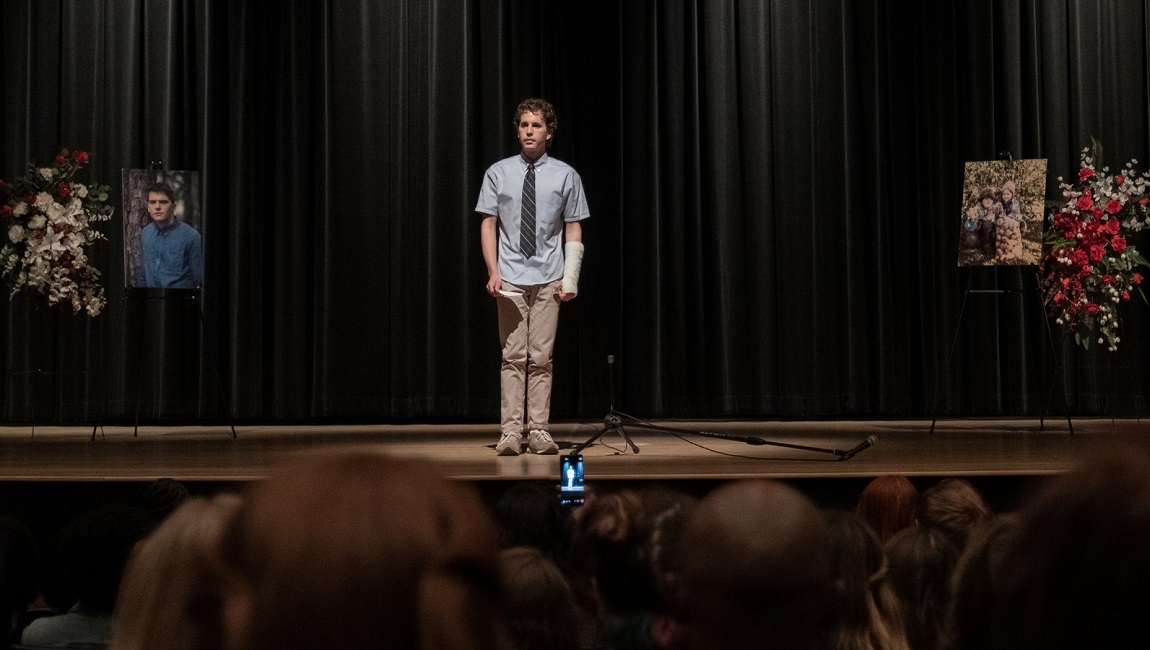Dear Evan Hansen is a manipulative, unintentionally awkward musical plagued by a black hole of a lead character.
Dear Evan Hansen makes a pretty strong case for the second biggest recent Broadway smash in the Hamilton world we all live in — yes, still — and so it was probably inevitable it would make its way to screen sooner than later. Less of a foregone conclusion was that it would arrive in the hilariously maudlin package that director Stephen Chbosky delivers in his film version. An author-turned-director known for The Perks of Being a Wallflower (both for writing the novel and directing the film adaptation) and the surprisingly not terrible Wonder, one of Chbosky’s proven strengths is in finding authenticity within the typically saccharine and manipulative confines of “Young Adult” art. So in a way, a pivot to Broadway makes a certain amount of sense, the director having demonstrated his facility with pitch-correcting heavily-affected and treacly material; on the other hand, that very character is part of musical theater’s DNA, so why pinpoint a voice specifically known for softening arch edges?
But before that can even be assessed, first a little context. Dear Evan Hansen‘s narrative is an age-old story of a sad-boy caught in a classic mix-up. Evan Hansen (Ben Platt) is an anxious, depressed loner without any friends — unless you count Jared (Nik Dodani), who insists on being referred to only as a “family friend” — and who has begun writing letters to himself as a therapist-suggested exercise (hence the title). Then, a few things happen: a hotheaded classmate, Connor (Colton Ryan), offers to sign Evan’s new cast; later, Connor finds Evan’s recent letter, which references Connor’s sister Zoe (Kaitlyn Dever), and freaks out. A few days later, Connor has killed himself, been found with Evan’s letter, and the signs seem to suggest the two were friends, which Connor’s parents (Amy Adams and Danny Pino) latch on to. Evan, of course, after limp protestation, begins to go along with the ruse, first out of sympathy for Connor’s family, but then because he begins to get attention and even goes viral for a song he performs. All sound appropriately Broadway?
Honestly, it’s unclear how much Chbosky’s involvement matters. The material doesn’t feel flattened so much as pumped full of valium, mainly according to the guiding presence of star Platt (of the original Broadway show), who plays Evan with such a pronounced sadsack physicality that it’s impossible to do much other than chuckle as this king goober bumbles around hallways and through awkward conversations. The affected performance, all exaggerated mannerisms and slouched shoulders and wide-eyed anxiety, might work within the stage aesthetic, but it simply obliterates any potential for nuance here — and in case his dorkdom wasn’t clear, Platt’s wardrobe seems to have been plucked from the closet of someone who always the latest Hot Wheels pricing guide, and his Richard Simmons wig and pasty-white mien help complete the look. It’s tough to say whether the show’s success and Platt’s mini-stardom won out in keeping to this tonality or if Chbosky thought all of this piling on was a good idea; it doesn’t ultimately matter much, as long as we acknowledge there’s plenty of blame to go around for all this hokum.
But beyond this black hole of a center, there’s still little that makes sense or works in Dear Evan Hansen. The music, which comes courtesy of Benj Pasek and Justin Paul — the duo who won a Tony for the original stage play the same year they won an Oscar for La La Land — is glacially deployed here, only a few big numbers littered across the film’s massive 137-minute runtime, and it fails to inject much energy into pervasive lethargy. Melody is also often forsaken, with a half-spoken half-sung thing frequently sapping vitality, and that’s not to mention the completely nonsensical diegetic (or is it?) incorporation of the songs, which is confused more than a few times. (In other words, its self-seriousness and narcotized delivery is very much the opposite of Pasek and Paul’s underrated and unabashed The Greatest Showman, which is an absolutely wild work of anthemic hubris.) To Dear Evan Hansen’s credit, there’s a song about how the dead kid was an asshole, which is a fun little wrinkle, and one absolutely gut-busting moment of dramatic Shakycam (which suggests Chbosky isn’t entirely blameless here). The film also beats viewers over the head with the notion that Evan is poor — flaccid attempts to connect this to his charade don’t land — but when Zoe visits his bedroom, it’s roughly the size of Liechtenstein (no one understands poverty like Hollywood). And then there’s the film’s conception of Internet culture, which suggests that this mopey kid singing a sappy song would result in universal adoration instead of this dweebus getting relentlessly owned on every online platform. If all of this seems harsh for a timely film about acceptance and the toxicity of lite-tribalism, it’s all in proportional response to the concerted, sub-13 Reasons Why manipulative efforts of Chbosky and co. to engender soppy feels in audiences. All of this pablum might work within the garish context of Broadway, but it’s tough to recall a more awkward cinematic musical translation than Dear Evan Hansen.







